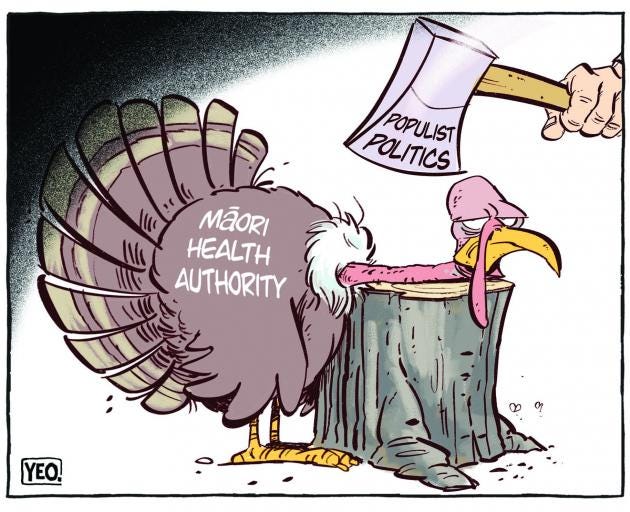Wellington City has become a great case study for those that are suspicious that both local and central government politicians have become enthralled by property developers, the “professional managerial class”, and other vested interests. Politicians from parties of both left and right are increasingly seen as being captured by such interests, regardless of whether they are Greens, National, or Labour. And rising public discontent is the result.
Confidence in Wellington City Council (WCC) has been plummeting in recent years. When surveyed in the past two years about satisfaction with council decision-making, the results have varied between 41 and 52 per cent who say they are “dissatisfied” with the WCC. Last year, only 17 per cent of Wellingtonians said they were “satisfied”. When the survey is repeated later this year, it will be surprising if anyone at all admits to being satisfied. Other numbers have also been plummeting in the annual survey, showing fewer Wellingtonians have pride in the city, think it’s a great place to live, or feel safe in the city after dark.
City Council spin
The WCC is in financial disarray and currently considering cuts across the board in services to the public. But the areas deemed off limits for cuts are the PR and senior management roles – the types of people that are increasingly referred to in Wellington as the “professional managerial class”.
This part of the Council has just launched a new billboard and t-shirt campaign called “Positively Pōneke”, which the WCC’s economic wellbeing manager Anna Calver says is designed to “help keep people aware of all the good change under way” and bring “those absolutely positive vibes to a hoarding near you”. The big public relations campaign will, according to the council, get Wellingtonians “to stop grumbling about our brilliant city” – especially the “grumbling” journalists who have been reporting on the local politicians’ infighting and waste of ratepayers’ money. This was revealed yesterday by one of the grumbling journalists – Andrea Vance in her Post article, Council's 'spin spend' revealed (paywalled)
Wellington public service PR and comms have been reported to have increased by more than 50 per cent in recent years, and similarly, the local government is now employing huge numbers. Vance reports that the WCC Comms budget has grown to $5.3m: “The list seen by The Post shows 54 in the comms team, though the council claims the number is 47.1. Seven are managers and seven create “content”, including three producers and a photographer/videographer. Four people are hired specifically to share the council’s messaging via social media, and there are seven graphic designers.”
The WCC had previously also been spending millions more via the local government agency Let’s Get Wellington Moving. Much of the budget of LGWM – which was recently abolished by the new National-led Government – was spent on consultants, and its biggest output was in terms of communications rather than building any infrastructure.
However, the Post’s Tom Hunt reports today that some of LGWM’s plans are living on, now being implemented by the Council. But it is causing more controversy – he reports that there is upset from shops on Cuba St where the WCC is getting rid of car parking – see: Let's Get Wellington Moving lives on in Cuba St – to shop owners' annoyance (paywalled). Shop owners say they’re not being properly consulted about the change, and that it will destroy their businesses.
Corporate welfare for Wellington businesses
Currently, the biggest issue of contention at the Wellington City Council is Mayor Tory Whanau’s secret negotiations to buy land in Courtenay Place under a cinema complex, giving the multinational Reading Cinemas $32m so they can more easily afford to earthquake-strengthen their building. The Council is meeting today to decide on this.
The biggest concern about the deal is that it amounts to “corporate welfare” and sloppy management of ratepayers’ funds during a time of WCC’s financial crisis. But the secrecy of the deal is also highly controversial, which led a Council insider to blow the whistle, leaking details to the media. The Mayor then spent $43,000 hiring Linda Clark to hunt down who leaked it, but she came up with nothing.
The Herald’s Georgina Campbell reports on all this today – see: Corporate welfare or visionary? The secret Reading Cinema deal dividing Wellington (paywalled)
In terms of the secrecy aspect, Campbell says that many councillors believe that the closed-doors approach has “increased public suspicion and aggravation about the council.” And even Mayor Whanau says that it has fuelled what she claims is “misinformation” about the deal she has been negotiating.
Campbell suggests that Whanau initially came up with the deal to increase her popularity because she’s been under huge scrutiny and criticism for her performance. Campbell says: “Whanau needs a win now more than ever after her personal life went on to become a distraction last year.”
Leftwing Post columnist Dave Armstrong has also written this week that the “shady little cinema deal” is being driven by Whanau because she hasn’t delivered anything else as Mayor. He notes that several other ostensibly leftwing and environmental councillors have backed Whanau – including the newly elected Geordie Rogers who came in on the by-election caused by Tamatha Paul jumping ship to Parliament.
Armstrong questions why such supposedly leftwing politicians would side with the corporates on this: “I can’t imagine that many twentysomethings in Aro Valley said to Geordie Rogers during his campaign, ‘you’ll get my vote if you pour millions into the Reading complex’. Surely issues of infrastructure, renters’ rights, housing intensification, public transport, cycling and night safety are much bigger issues to the Whanau whānau? This seems something driven by council managers and officers, with the mayor supporting it because she needs a win” – see: You don’t need to be a real estate expert to see the flaws in city council plan (paywalled)
Armstrong speculates that Whanau and her supporters on the council will try to sell other council assets to fund the deal. He advocates instead, that the cash-strapped council could better raise funds and force the cinema chain to fix their earthquake-prone building by implementing a new system of land values tax (instead of capital values): “If we had a land-based rating system it would be prohibitive for entities like Reading to sit on vacant land for as long as it has. They would have to pay rates as high as businesses using that amount of CBD land productively – which could be in the hundreds of thousands. Rather than doing nothing, as Reading has done while it’s tried to do a deal with the council, they would be incentivised to sell, hopefully to a local company that wanted to use the land productively and do business in the city for a long time.”
The idea is unlikely to fly, according to BusinessDesk’s Dileepa Fonseka, who suggests that land-banking and the under-utilisation of land are a big part of the economy and therefore important to vested interests. He says “the loudest ratepayers generally hate this form of ratings levy” – see his Monday column, Tale of two taxes hits cinema (paywalled)
Fonseka reports that a new activist group, Common Ground Aotearoa, has launched to advocate for “councils to levy their rates on the basis of land values rather than capital values”. They have looked at the Reading Cinema issue, and claim: “the land’s owner would end up paying $255,392 more per year in rates under a land value rating system – an increase of more than 88%.”
The group argues that other big landowners would also pay more – such as “car park owners and car dealerships. The owners of Ghuznee St carpark, Wilson Parking, would pay $67,839 in rates while the Toyota dealership on Kent Terrace would pay $202,540, an increase of 87.6%.” They argue that most residents would pay less. But some other property vested interests will keen on this campaign – property developers and commercial building owners would suddenly get their hands on more land and lower rates.
Housing zoning wars in Wellington
The majority of the WCC are also backing property developers to be able to build more housing in Wellington City. They had hoped that the government-mandated Independent Hearings Panel in Wellington, made up of urban planners, would provide recommendations to deregulate zoning restrictions on property developers. However, the urban planners didn’t deliver this and instead advocated keeping strict regulations on what can be built in the city. This has been highly disappointing for the coalition of property lobbyists, free-market economists, and Yimby (Yes In My Backyard) activists.
But good news came yesterday when the new Minister of Housing, Chris Bishop, announced that he was going to step in to resolve any disagreement between the WCC and the urban planning professionals. Bishop has long been aligned with the Yimby and property development lobbyists, so the news wasn’t too surprising.
It is being taken to mean that he will mandate the Council to undertake deregulation in favour of the property developers and Yimbys. Hence, the news is being well received by those on the left in Wellington who are part of this political alignment – see Erin Gourley’s Labour, Green councillors pleased that Chris Bishop will decide on housing plan (paywalled). Such news will only further the suspicions of those who believe the the Wellington left has formed an unholy alliance with the political right on housing development and deregulation.
Bishop was launching the Government’s “Build for Growth” plan at the Wellington Chamber of Commerce. For the best coverage of his speech, see Thomas Coughlan’s Chris Bishop takes control of planning appeals, floats GST sharing as solution to housing crisis
Not all are convinced that National’s plans for housing sector deregulation will be successful. Today’s editorial in the Otago Daily Times agreed with Bishop’s statement about the need to address “the national disgrace that is our broken housing market”, but challenged whether his plans add up, saying his ordering of densification amounts to “hyperbole, and it remains to be seen if such an inundation will actually make land cheaper and encourage developers to build” – see: A home to call one’s own (paywalled)
The newspaper also identifies the Government’s weak point in its housing plans: “The elephant in the room of this discussion is infrastructure. All the people living in these new houses in 30 years’ time will need roads and public transport to get to them, and security of supply of water and electricity once they close the door.”
But the New Zealand Initiative’s Chief Economist Eric Crampton is celebrating the Government’s signals that they will cut housing red tape and regulations. For a free-market analysis of why this is good, and why urban planners are the problem, see his Post column from Saturday: This is why Wellington should be called Lowerer Hutt (paywalled) and today’s Newsroom column: Uncompetitive urban land markets at root of housing problems
Dr Bryce Edwards
Political Analyst in Residence, Director of the Democracy Project, School of Government, Victoria University of Wellington
This article can be republished for free under a Creative Commons copyright-free license. Attributions should include a link to the Democracy Project (https://democracyproject.nz)
Cartoons today
Please share this email newsletter with others. Anyone can subscribe, for free, by clicking on the button below.









This is the problem with treating senior public servants like private enterprise CEOs seems to me. They get a huge salary and a similarly sized sense of entitlement. You never saw these huge PR departments when they were actually servants of the public. And this has been true ever since Roger Douglas was let loose, so it's not just this council. When my son was a kid years ago he asked me once "What does the council do?" I said well it looks after the parks and collects the rubbish and fixes the water pipes and so on. I was obviously wrong about the last one, and all I can say is what the hell were you doing all this time.
"The idea is unlikely to fly, according to BusinessDesk’s Dileepa Fonseka, who suggests that land-banking and the under-utilisation of land are a big part of the economy and therefore important to vested interests. He says “the loudest ratepayers generally hate this form of ratings levy” – see his Monday column, Tale of two taxes hits cinema"
The same vested interests have so far resisted any attempt to tax capital gains. As economist Bernard Hickey has said, NZ's economy is basically "a housing market with bits tacked on". And it's fomented a new landed gentry that settlers tried to get away from in Britain. The way things are going, it'll take a severe bubble burst to correct it, when even a pandemic or natural disaster couldn't.
Furthermore, some people need reminding that "F**k off, we're full" is a xenophobic slogan, not a housing policy.